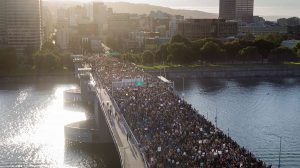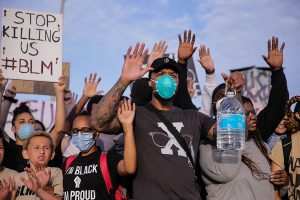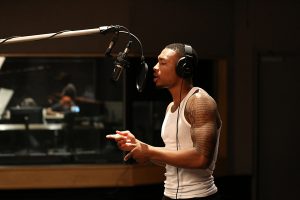Oakland’s Damian Lillard on how we can be allies to Black people in the Bay Area
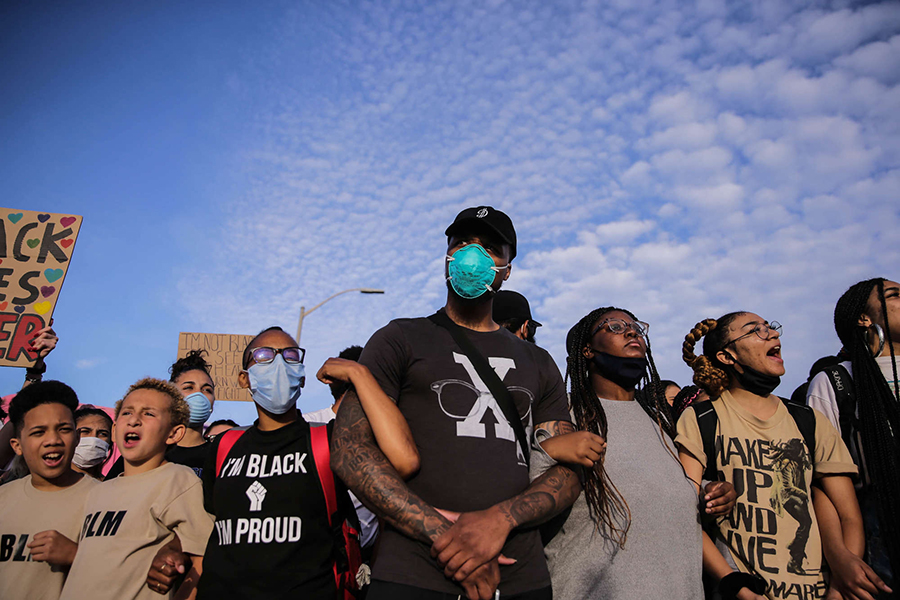
Damian Lillard walks arm in arm with other Black Lives Matter protestors on the Morrison Bridge in Portland, Oregon on June 4, 2020. Photos courtesy: Bruce Ely/Trail Blazers.
A day prior to getting his first on-court action in more than four months in the Portland Trail Blazers’ first scrimmage game of the NBA restart in Orlando, Oakland’s Damian Lillard sat down with myself and editor Daniel J. Willis to talk about how he’s been moved to act following the police murder of George Floyd in Minneapolis on May 25.
This story is the second part in an ongoing series. Read part one, with Fantastic Negrito.
Lillard, who’s not just one of the best basketball players alive but, as Dame D.O.L.L.A., is a hip-hop artist who’s recorded with the likes of Lil Wayne, Q-Tip and the East Bay’s G-Eazy and Raphael Saadiq, took part for the first time in a Black Lives Matter protest for justice in Portland, and walked away from it feeling both inspired and fed up. That led to the fiery spoken word song and call to action in “Blacklist.”
Lillard raps: “As a brother with a good heart/ I say fuck you if you’re racist/ Or white staying quiet/ You disabling the changes. … Used to call us monkeys/ And slaves until we overcame/ Still our work is just beginning/ Protests look like parades.”
After the Blazers left for Orlando, Portland erupted in violence thanks to President Donald Trump sending in federal troops to deal with protestors, most of whom have been peaceful. Lillard, who’s socially engaged in his adoptive city, has been in touch with Portland Mayor Ted Wheeler, who himself was tear-gassed in one of the clashes with soldiers this week.
Lillard is also still a proud spokesman for Oakland, where he’s thrown an annual block party for his neighborhood of Brookfield, providing live entertainment and food, as well as covering the cost of haircuts and hairstyling for kids, a bounce house and even a zipline. Yesterday, he took part in a fundraiser live-stream concert organized by Sheila E that benefited her nonprofit Elevate Oakland, which provides financial support to arts programs in Oakland public schools, a well as Black Lives Matter Global Network Foundation.
He spoke with RIFF about how he still gets pulled over by police, how he felt after the death of Oscar Grant, whom Lillard knew, and how those of us who aren’t Black can still be allies in the Bay Area.
Roman Gokhman: I know you’ve got your mind on a lot of things, and the NBA restart, but how much have you been paying attention to what’s going on in Portland, with Trump’s federal soldiers more or less kidnapping people in unmarked vans? And what’s your reaction been from Orlando?
Damian Lillard: At first I saw videos of it, and when I started watching, I was like, “That looks like Portland.” And then I saw that it was Portland, and I started to reach out to people that I know in Portland that might have an idea about it. I reached out to the mayor of Portland, and they kind of filled me in. It was disturbing just to know that it’s federal troops on the streets basically kidnapping people, and taking them in unmarked cars. People being taken to random locations.
It’s all from peaceful protests. I was a part of one of the protests, and it’s not like people out there doing crazy stuff. I know that when people first began protesting, it was some stores broken into, some looting and some stuff like that. But that was like a one-time thing. For the last few months, it’s been peaceful protests. Nobody’s been doing anything crazy. It hasn’t caused harm to anybody in these protests. So to see this be the result because of how consistent or persistent they’ve been in showing up, I think, is unacceptable. And it’s scary because you out here peacefully protesting, and you don’t know what’s gonna happen. You don’t know where this is coming from. You don’t know what type of instructions they’ve been given.
Like you just said, they were brought in to basically take people off the streets and get them to stop showing up, but you don’t know how they’ve been instructed to make that happen. Some people might say, regardless if they here or not, “We’re gonna still show up.”
You don’t know what they’ve [the soldiers] been told. You see people are getting beat; people are getting manhandled for no reason. “Just get off the streets.” And that is dangerous and a scary thing. I watched it a little bit closer than before now that I know that this is in Portland. I worry about that because you don’t know what’s gonna happen.
Do you have any thoughts about why Portland is getting this attention? Or even why the protests in Portland have continued on longer than some of the other places nationwide?
Damian Lillard: I’m not sure, but I know when I was out there a lot of the protest was led by groups of young people, and they were really passionate, and they just were constantly saying, “We’re gonna be out here; this is not a situation where we just doing it because it’s trending right now, and everybody else is doing it. We’re gonna be here for the long haul, and it’s going to be consistent. We’re gonna keep pushing our line, and we’re gonna be here. And we want people who feel the same as us to continue to be here as well.” And I think because there’s been, I believe, a record number of days in a row of people being out there, that it probably raised eyebrows and caught [the federal government’s] attention. Because of that, they probably felt it was necessary to send out federal troops to be the muscle and get people off the streets. That’s the best thing I can come up with.
After you get out of the NBA bubble in Orlando, which hopefully won’t be for a very long time—
Damian Lillard: I plan on being here for a while.
Afterward, will you rejoin the protests?
Damian Lillard: I mean, if they haven’t snatched people up off the streets to the point where nobody’s out there. I mean, possibly. Not sure.
Oakland, your hometown, is very important to you, especially Brookfield, your neighborhood. This will be the first time you won’t hold your annual block party for your neighborhood. How hard is it to miss putting this on for the first time since you’ve had the money to do it?
Damian Lillard: I think it will be more hard if I wasn’t occupied, you know? Typically, I’d be on summer time right now, and I’d be free to go and do what I want. And I’m sure there will be a way for us to still have a version of it if I wasn’t playing. It sucks because my community gets that one time a year, and a lot of people look forward to it. And it comes with a lot of joy and happiness for people, so the fact that I won’t be able to give that to them, or myself. Because I enjoy it equally as much as they do. To me, that just means we got to do it that much bigger and that much stronger for the next time that we do it.
Your song, or, your spoken word piece “Blacklist” is really poetry. Lots of people have weighed in and echo the sentiments you state there. What was your frame of mind when those words came to you and how did that happen? Did that happen over the course of a day? Is that something that had been building up in you already at that point? Was it after watching the [George Floyd] video?
Damian Lillard: It was something that had been built up. I was just kind of watching everything that was going and seeing everything that was happening and just growing frustrated. I have real feelings. It wasn’t like I have much to think on, you know. These are my real feelings about what I was seeing. Then I went to go protest, like we talked about. And you know, I left there feeling like, man. I left there feeling a part of the group. That experience really was an eye-opener for me because I had never done it before. I never been a part of something like that.
That was your very first protest?
Damian Lillard: Yeah, that was the very first time. … I felt a part of history, like I had done something to connect myself to a lot of the icons of Black history and people who came before us. You know, it dawned on me that we are still fighting the same fight that we’ve been fighting for so long. You know what I mean? Like, as free as we think we are, and as much opportunity as we have—is really nothing. People fought and gave their lives for us to be able to have the life we have now, and it’s still not the way it should be.
You know what I’m saying? So, when I sat with that and had that experience, I sat there and I just wrote out how I was feeling. I didn’t even write it to a beat, you know. I was just kind of ventin’ in my notes and that’s what it turned into.
Damian Lillard: Yeah.
What was it like watching those protests when they happened, basically a decade ago at this point?
Damian Lillard: Yeah, I think it was like 2010, maybe 2009.
What kept you from being there? Were you in school?
Damian Lillard: Yeah, I was in school. I had heard about it just from my brother, because [Grant] played football with my brother in high school. You know, we all used to catch the 40, the bus, because we all went to school. I went to middle school and my first year high school in San Lorenzo, in the San Leandro area. And my brother went to San Lorenzo High School. Oscar Grant went to San Lorenzo High School. Like, all my cousins went to San Lorenzo High School. So we would all get on the 40, get on a bus early in the morning because we were going through two cities, basically, to get to San Lorenzo from Oakland. You just see a bunch of kids getting on a bus together, from Oakland, and going to a different school district. We spent those moments around each other.
Just to take that call from my brother, he like, “You know, Oscar got killed by a cop.” And then you see it all over the news. For me it was like, “Wow, all this is like a real huge outcry, and people really going crazy over Oscar.” That’s what I was thinking. And then you start to see the protests, and you start to see people just kind of rioting in Oakland and that was my first experience with, like, “This is really happening.” You know what I’m saying? “This is real. He’s really gone. People are really fed up.” That was my first experience, and it just happened to be somebody that I knew. So now, when these things keep coming up, I automatically have a connection to it, or it raises real feelings about it.
“Blacklist” wasn’t your first overt protest song. You wrote “Bigger Than Us” in 2016 after Ferguson. In that song, you rap, “If I get pulled over should I be afraid?” Does that still happen to you? Or at what point did that stop? What’s your thought when you see a police car behind you, for whatever reason?
Damian Lillard: I mean, I still get nervous if a cop gets behind me. I got pulled over maybe two months ago. I was on my way home, and I was driving down the street. I bought a car a while back in California. And I had a lot of stuff done to it, like a lot of custom work. The car was just delivered to me in Portland. And since we were in quarantine, and, you know, all the stuff with COVID-19, the DMV wasn’t open for appointments as far as doing registration and all that stuff.
I was driving the car, and the cop just kind of got behind me. But when he was behind me I saw … his lights above the car, kind of flashing. I was pulling up to a stop sign, and I was gonna make a right and pull over right after I got to the stop sign. When I got to stop sign, he pulled up [to] my driver’s-side window, and was like, “Roll the window down.” I was hesitant to roll the window down, like, “What is this?” What is he doing, you know what I’m saying? He literally pulled up right on the side of my car. And then when I rolled the window down, he was like, “You know, you don’t have tags.” We had a conversation, and it was weird to me that he didn’t just pull me over or whatever and do the usual, or what the normal thing is. We just had a conversation like that, and he ended up letting me go. But just the fact that he pulled right up next to me was like, “Shit.” I was nervous about it, like, what is it? What is he doing?
I don’t feel like people should have that feeling [with] people who are sworn to protect and serve. When you’re out on the streets, you shouldn’t have that feeling, because that’s not what they there for. But because of my experience, and what we’ve seen countless times, that was the feeling I had.
Do you think it ended where it ended because he recognized you?
Damian Lillard: I think when I rolled the window down, he recognized me. The same thing happened one other time. I was driving home after a game. I was on the freeway, and I was probably doing 10 over the speed limit; I don’t know. There was no other cars on the freeway and the car gets behind me; I see the lights come on. I get off the freeway. I pull into a gas station right off the freeway.
He gets out the car, he walks up. As soon as I roll my window down, he looked; he was just like, “Hey Dame! What’s up, man? Good game, whatever, whatever. Can we take a picture?” I took a picture with him, and he let me go. It’s not always a bad run-in, but it’s just a feeling of what is about to happen, you know what I’m saying? Because I’ve also been racially profiled in the middle of the desert.
I read about that.
Damian Lillard: That might have been one of the most scariest things in my life because I was like, “This is not normal.” You just don’t know, you know? You don’t know what’s gonna happen in these run-ins with the law, so I definitely get nervous every time I see a cop, even if they don’t pull me over. Whenever they are in the vicinity, or I see one, I mess around and turn down the street that I don’t even need to turn down just to get out of dodge or get out of sight, you know?
The NBA is allowing players to wear a social justice message on their jerseys, and you’ve opted for “How many more.” I read that LeBron James chose not to have any messages at all on his jersey. Is it the right step? Do you think it’s perhaps not enough?
Damian Lillard: I think it’s a positive thing that they’re giving us that option. … I think LeBron might have had an issue with the fact that he couldn’t freely choose exactly what he wanted to put on his jersey. So the fact that they gave us a list of things was, like, “All right, there certain things we don’t want.” It gave that type of vibe where it’s like, “We don’t want to give the freedom to put anything on the jerseys, but here’s a list of things that we feel are appropriate.”
That kind of made some players feel a certain type of way. And I felt a little way about it, too, because why is there a limit on what we should be able to express if this is something that you guys care about the way we care about it? Why aren’t we open to express what we want to express on our jersey? That was the issue amongst players. But for me, I chose the option of actually still having something to express myself. And that’s why I still chose something.
Have you thought about what you would have chosen, if you had free rein to say whatever you wanted to?
Damian Lillard: I mean, I probably would replace my name with “Oscar Grant,” and I probably would have put a message on the bottom that said “THUG” as the acronym: “the hate you give.”
What can we and our readers do to be allies to Black people in the Bay Area?
Damian Lillard: I think you guys can be allies to Black people in the Bay Area by just having a better understanding of us. I think Black men, specifically, but Black people in general are viewed as threats, because of whatever; the way we look, how we’re built, the tone in our voice, how aggressive, we might [seem]. Whatever it is. I think they just need to learn about us.
We come from families. I come from a big, strong family of showing people respect, doing well in school, having character, being a hard worker, not judging, you know. But if you see me in a public situation where I’m out and about, I’m going to behave, or my body language is going to be, you know; I got to protect myself and I gotta be on my toes, and I gotta pay attention, and I can’t think everybody’s gonna be my friend because of the environment. You know I’m saying?
We’re taught to be this way because of the environment. We know that it’s not in our favor. So once we leave our house, or leave our family, we got to behave and operate in a way to make sure we’re gonna make it back. So, we’re going to have that type of energy where it might not always be welcoming or whatever, but don’t judge. You got to learn us. Learn what we come from, because we come from strong stuff, man. Black people are family oriented, caring, loyal people. I just think you got to learn it. So that way, when you see us out, you’re not just judging.
And you’re not looking at us as the aggressors all the time, or uneducated, not smart, or less than, or a threat, or criminals or whatever it might be. Because you don’t know, man. I know a lot of people who look one way, but I know them, so I know who they truly are and what they truly are. You gotta learn, you gotta educate yourself.
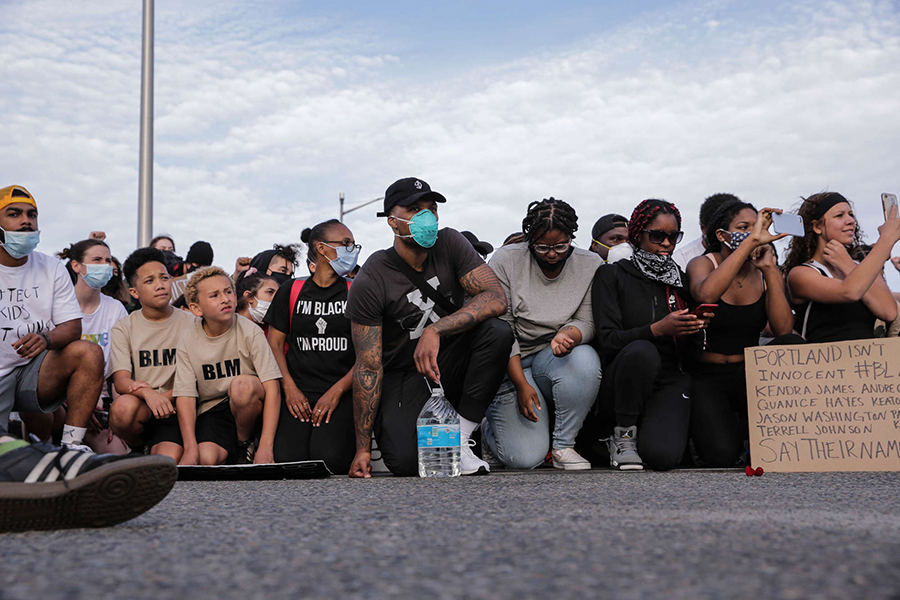
Damian Lillard kneels with other Black Lives Matter protestors.
Photographer Martin Lacey and editor Daniel J. Willis contributed to this report. Follow editor Roman Gokhman at Twitter.com/RomiTheWriter.

